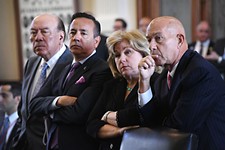Worth the Dough?
Fri., June 18, 1999
Overall, however, Austin did little more than tread water this session -- keeping its head above the surface, but never really making progress. Whether Austin's lobbyists were worth it will be hotly debated in upcoming budget cycles, but nearly everyone involved agrees that the city had to do something to keep from being steamrolled by an increasingly suburban, anti-Austin Lege.
In many cases, the city came out on top. The anticipated annexation bill was much better than many predicted -- the legislation that finally passed requires cities like Austin to negotiate with a territory prior to annexation, and limits the ability of unincorporated districts slated for annexation to diminish their value to the city by drastically lowering taxes or entering into long-term contracts. But an onerous proposal that would have allowed residents to vote on whether they want their community to be annexed failed. So did several bills that wouldhave allowed annexed citizens to vote to disannextheir community. Overall, says Austin Sen. Gonzalo Barrientos, the city did "fairly well" this session. "The annexation bill was a fair piece of legislation. ... It did not destroy the city's authority, but it gave some people in outlying areas more input."
One piece of legislation that most lawmakers considered a red herring turned out to be the session's Trojan Horse. Rep. Ron Wilson's bid to keep the recently closed Robert Mueller Municipal Airport open for general aviation was a proposal that seemed so ludicrous (like the Houston Democrat's bill to dissolve the city of Austin and rename the area the "District of Travis"), that few of the city's lobbyists paid it much attention until it was almost too late. After all, the legislation flew in the face of both city resolutions and federal mandates. But when Wilson managed to get it through the House, as an amendment tacked onto a Department of Public Safety sunset bill, Barrientos had to vow to filibuster, if necessary, to keep it from passing the Senate as well. Barrientos says he was just protecting the sanctity of the legislative process. "I told them [the senators] I was not going to play any games with the bill," Barrientos says. "That bill was grandstanding, making a mockery of the legislative process. It was a given that if they would have put it up [on the Senate calendar], I would have stopped it."
Austin Rep. Elliott Naishtat, who represents central Austin, was able to pass legislation, inspired by the controversial Triangle development, that requires the state to notify residents of areas surrounding tracts of state land when the land goes on the market. "There's nothing in statute now that requires citizen input. Everything that happened with the Triangle happened because neighborhoods made it happen," Naishtat says, referring to the belated but prolonged public debate that altered the scope of the area's commercial development. The bill also allows citizens to request a public hearing on the sale of state lands, and requires the state to honor any such request.
The most crushing hit the city took was the passage of HB 1704. The law (first passed in 1995 but accidentally repealed in 1997) allows developers to finish projects under the water-quality standards that were in place when the projects were initiated. It was a major loss for the city and a stunning blow to the concept of local control. City officials say the legislation seriously undermines the hard-won compromises recently made between the Save Our Springs Coalition and the Real Estate Council of Austin on Austin's water quality standards. But Karen R. Johnson, the city's chief lobbyist at the Lege, says 1704 was one bill Austin had no chance of beating from the beginning. "There is a huge sympathy vote for that kind of legislation," Johnson says. "What we were arguing was, we wanted the local control to decide those issues ourselves and not have the Legislature make those decisions for a local entity. But it's very obvious that the Legislature as a whole wants to do that, and they are going to do so."
Hardly two weeks out of session, city officials were already discussing what to do about 2001, when the next crop of Austin-bashing bills will pop up at the Capitol. It's anybody's guess how much money Austin will be willing to cough up for protection from legislative liability the next go-round, but it's clear that the city considers its first full-scale foray into lobbying a smashing success. "I think in a number of areas where we were working, especially to prevent legislation that was harmful to the city, the city would have been less likely to be successful without the lobby team," says John Hrncir, Austin's chief of governmental relations. "The responses I have gotten have been positive. ... Given the things that were at stake, I think the city came out very well." --E.C.B.
Got something to say on the subject? Send a letter to the editor.








